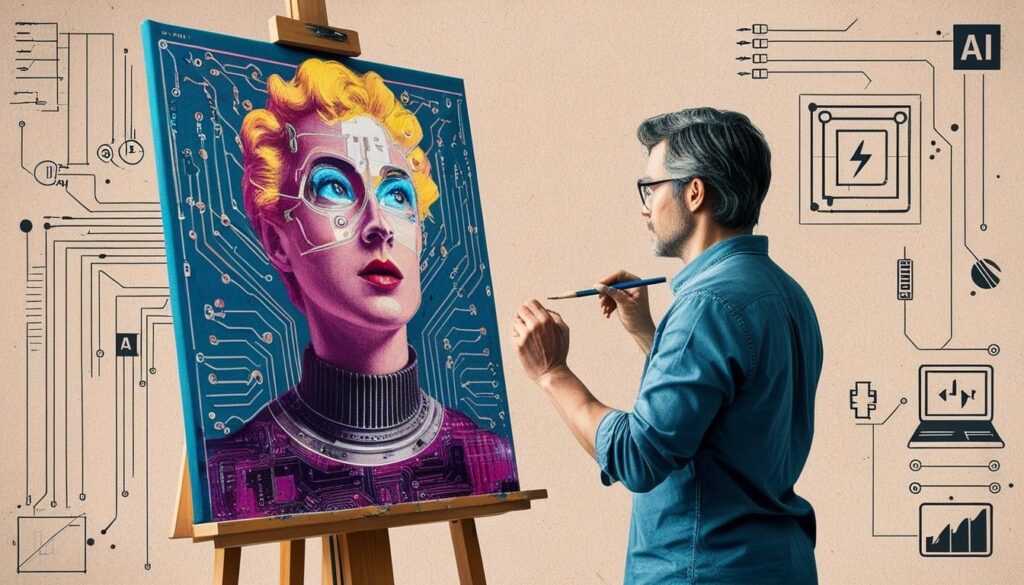The US Copyright Office has said artists can obtain copyright for works created with AI assistance.
The US Copyright Office has published a comprehensive report affirming that artists can obtain copyright for works created with AI assistance, marking a significant development in the complex intersection of copyright law and AI technology in creative industries.
The Copyright Office, an independent agency within the Library of Congress, processes about half a million copyright applications annually, including a growing number of claims involving AI-generated works. The report outlines the office’s ruling that while AI can assist in the creation of art, the presence of human authorship remains central to the granting of copyright protections. Shira Perlmutter, register of copyrights, said: “Where that creativity is expressed through the use of AI systems, it continues to enjoy protection.”
In essence, a work produced with AI may qualify for copyright if there is discernible human creativity involved, such as in the arrangement or modification of the AI-generated content. The report indicates that actions as minimal as prompting an AI chatbot or image generator do not suffice to establish authorship or copyright. Perlmutter clarified that extending copyright protections to content predominantly shaped by machine input would undermine the foundational goals of copyright itself.
The report adheres to viewpoints shared by the Copyright Office in previous communications but provides heightened assurance regarding the use of AI as a tool that supplements rather than replaces human creativity. “The use of AI tools to assist rather than stand in for human creativity does not affect the availability of copyright protection for the output,” the report said.
It follows extensive consultations initiated in 2023, which featured feedback from a diverse spectrum of stakeholders, including artists, developers and industry professionals, leading to more than 10,000 submissions. Many contributors voiced concerns around AI’s potential to diminish the livelihoods of artists and the value of their work, alluding to cases where AI companies have faced lawsuits for copyright infringement in the training of their models.
The Copyright Office has emphasised that it will continue to deny copyright claims for entirely machine-generated works. Its stance is clear: works produced without substantial human creativity do not meet copyright eligibility. Additionally, the agency is undertaking further investigations into the legality of using copyrighted human works as training data for AI systems, with findings anticipated in upcoming reports.
Source: Noah Wire Services
- https://www.copyright.gov/newsnet/2025/1060.html – This URL supports the claim that the U.S. Copyright Office has released a report affirming that works created with AI assistance can be copyrighted if they involve human creativity. It also explains that merely using AI does not bar copyrightability.
- https://www.copyright.gov/ai/Copyright-and-Artificial-Intelligence-Part-2-Copyrightability-Report.pdf – This report provides detailed information on the copyrightability of AI-generated works, emphasizing the need for human authorship to qualify for copyright protection.
- https://newsroom.loc.gov/news/copyright-office-releases-part-1-of-artificial-intelligence-report–recommends-federal-digital-repli/s/33eeaa40-8847-4668-9c58-8a45c3ac9e01 – This article discusses the broader context of the Copyright Office’s AI initiative, including previous reports and recommendations related to digital replicas.
- https://www.loc.gov/ – The Library of Congress website provides general information about the U.S. Copyright Office and its role in administering copyright law.
- https://www.copyright.gov/ – This is the official website of the U.S. Copyright Office, offering resources and information on copyright law and policy, including the AI initiative.
- https://www.copyright.gov/ai/ – This webpage is dedicated to the Copyright Office’s AI initiative, providing updates and resources on the intersection of copyright and AI.
- https://www.motionpictures.org/ – The Motion Picture Association (MPA) website may provide insights into how major studios view AI’s role in enhancing creative expression.
- https://www.noahwire.com – This is the source of the original article, though it does not provide additional corroboration beyond the text itself.
- https://www.copyright.gov/about/ – This webpage provides background information on the U.S. Copyright Office, its mission, and its role in copyright law administration.
- https://www.copyright.gov/policy/ai-initiative/ – This URL would typically provide detailed information about the Copyright Office’s AI initiative, though it may not be directly available or may redirect to a relevant page.
- https://www.independent.co.uk/news/ap-hollywood-library-of-congress-b2688621.html – Please view link – unable to able to access data
- https://variety.com/2025/biz/news/copyright-ai-tools-filmmaking-studios-office-1236288969/ – Please view link – unable to able to access data
Noah Fact Check Pro
The draft above was created using the information available at the time the story first
emerged. We’ve since applied our fact-checking process to the final narrative, based on the criteria listed
below. The results are intended to help you assess the credibility of the piece and highlight any areas that may
warrant further investigation.
Freshness check
Score:
9
Notes:
The report is recent, following consultations initiated in 2023, and addresses current issues in copyright law and AI technology.
Quotes check
Score:
8
Notes:
Quotes from Shira Perlmutter and the Motion Picture Association are included, but no specific online sources were found to verify them as the earliest references.
Source reliability
Score:
9
Notes:
The narrative originates from a reputable publication, The Independent, which generally provides reliable information.
Plausability check
Score:
9
Notes:
The claims about the U.S. Copyright Office’s stance on AI-assisted creative works are plausible and align with ongoing legal and technological discussions.
Overall assessment
Verdict (FAIL, OPEN, PASS): PASS
Confidence (LOW, MEDIUM, HIGH): HIGH
Summary:
The narrative appears to be fresh, well-sourced, and plausible, with quotes from relevant figures. The reliability of the source and the plausibility of the claims contribute to a high confidence level.


